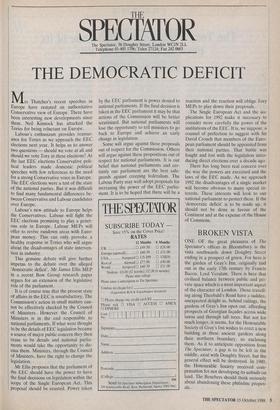The Spectator, 56 Doughty Street, London WC1N 2LL Telephone 01-405
1706; Telex 27124; Fax 242 0603
THE DEMOCRATIC DEFICIT
Mrs Thatcher's recent speeches in Europe have restated an authoritative Conservative view of Europe. There have been interesting new developments since them. Neil Kinnock has attacked the Tories for being reluctant on Europe.
Labour's enthusiasm provides reassur- ance for Tories as we approach the EEC elections next year. It helps us to answer two questions — should we vote at all and should we vote Tory at these elections? At the last EEC elections Conservative poli- tical leaders made domestic political speeches with few references to the need for a strong Conservative voice in Europe. The EEC elections were a test of the state of the national parties. But it was difficult to find many fundamental differences be- tween Conservative and Labour candidates over Europe..
Labour's new attitude to Europe helps the Conservatives. Labour will fight the EEC elections promising to play a gener- ous role in Europe. Labour MEPs will offer to revive rundown areas with Euro- pean money. This can only provoke a healthy response in Tories who will argue about the disadvantages of state interven- tion in industry.
. This genuine debate will give further Impetus to the debate over the alleged `democratic deficit'. Mr James Ellis MEP in a recent Bow Group research paper argues for an extension of the legislative role of the parliament.
It is of course true that the present state of affairs in the EEC is unsatisfactory. The Commission's action in small matters can- not be effectively checked by the Council of Ministers. However the Council of Ministers is in the end responsible to national parliaments. If what were thought to be the details of EEC legislation became a source of major public concern they then cease to be details and national parlia- ments would take the opportunity to dis- cuss them. Ministers, through the Council of Ministers, have the right to change the legislation.
Mr Ellis proposes that the parliament of the EEC should have the power to have the final decisions on legislation within the scope of the Single European Act. This proposal should be resisted. Power taken
by the EEC parliament is power denied to national parliaments. If the final decision is taken in the EEC parliament it may be that actions of the Commission will be better scrutinised. But national parliaments will lose the opportunity to tell ministers to go back to Europe and achieve an early change in legislation.
Some will argue against these proposals out of respect for the Commission. Others will argue against these propositions out of respect for national parliaments. It is our belief that national parliaments and cer- tainly our parliament are the best safe- guards against creeping federalism. The Labour Party may well adopt proposals for increasing the power of the EEC parlia- ment. It is to be hoped that there will be a reaction and the reaction will oblige Tory MEPs to play down their proposals.
The Single European Act and the im- plications for 1992 make it necessary to consider more carefully the power of the institutions of the EEC. It is, we suppose, a counsel of perfection to suggest with Sir David Crouch that members of the Euro- pean parliament should be appointed from their national parties. That battle was fought and lost with the legislation intro- ducing direct elections over a decade ago.
There has long been real concern over the way the powers are exercised and the laws of the EEC made. As we approach 1992 the disadvantages of a single market will become obvious to many special in- terests. These interests will look to our national parliament to protect them. If the `democratic deficit' is to be made up, it should not be done in favour of the Continent and at the expense of the House of Commons.


























































 Previous page
Previous page